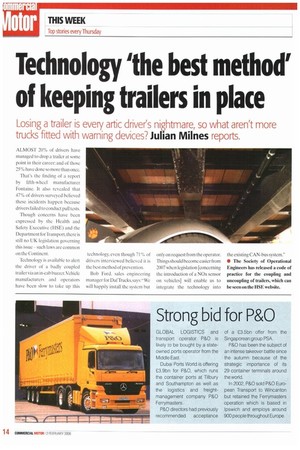Technology 'the best method' of keeping trailers in place
Page 14

If you've noticed an error in this article please click here to report it so we can fix it.
Losing a trailer is every artic driver's nightmare, so what aren't more trucKs fitted with warning devices? Julian Milnes reports.
ALMOST 20% of drivers have managed to drop a trailer at some point in their career: and of those 25% have done so more than once.
That's the finding of a report by 111th-wheel manufacturer Fontaine. It also revealed that 47% of drivers surveyed believed these incidents happen because drivers failed to conduct pull tests.
Though concerns have been expressed by the Health and Safety Executive (HSE) and the Department forlransport. there is still no UK legislation governing this issue such laws are common on the Continent.
Technology is available to alert the driver of a badly coupled trailer via an in-cab buzzer.Vehicle manufacturers and operators have been slow to take up this technology, even though 71 % of drivers interviewed believed it is the best method of prevention.
Bob Ford, sales engineering manager for Daf Trucks, says:-We will happily install the system but only on request from the operator. Th ngs should become easier from 2007 when legislation [concerning the introduction of a NOx sensor on vehicles] will enable us to integrate the technology into the existing CAN-bus system ."
• The Society of Operational Engineers has released a code of practice for the coupling and uncoupling of trailers, which can be seen on the USE




























































































































































































